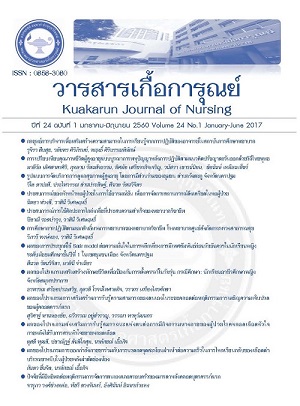ผลของโปรแกรมการเสริมสร้างการรับรู้ความสามารถของตนเองในระยะคลอด ต่อพฤติกรรมการเผชิญความเจ็บปวดของผู้คลอดครรภ์แรก* Effects of Self-Efficacy Enhancing Program during Childbirth on Pain Coping Behavior in Nulliparous Women
คำสำคัญ:
Self-efficacy, Pain, Childbirth, Nulliparousบทคัดย่อ
การวิจัยครั้งนี้เป็นเป็นการวิจัยกึ่งทดลอง (quasi - experimental research design) เพื่อศึกษาผลของโปรแกรมการเสริมสร้างความสามารถของตนเองในการเผชิญความเจ็บปวด ในระยะคลอดของผู้คลอดครรภ์แรก กลุ่มตัวอย่างเป็นผู้คลอดครรภ์แรก อายุครรภ์ 37 สัปดาห์ขึ้นไป จำนวน 56 ราย ที่มารับบริการที่หน่วยฝากครรภ์และห้องคลอด คณะแพทยศาสตร์วชิรพยาบาล มหาวิทยาลัยนวมินทราธิราช โดยเลือกกลุ่มตัวอย่างตามคุณสมบัติที่กำหนด แบ่งเป็นกลุ่มทดลอง 28 ราย ซึ่งได้รับโปรแกรมการเสริมสร้างความสามารถของตนเองในระยะคลอด ประกอบด้วย 1) จัดให้ผู้คลอด ชมสื่อวีดีทัศน์ 2) ซักถามสิ่งที่ผู้คลอดได้รับภายหลังการชมสื่อวีดีทัศน์ 3) จัดให้ดูสไลด์ประกอบการบรรยาย เรื่อง วิธีการเผชิญความเจ็บปวดในระยะคลอด 4) การสาธิตและการฝึกปฏิบัติ การบริหารการหายใจและการลูบหน้าท้อง และกลุ่มควบคุม 28 ราย ซึ่งได้รับการพยาบาลตามปกติ ทำการเก็บรวบรวมข้อมูลด้วยแบบบันทึกข้อมูลส่วนบุคคล แบบสังเกตพฤติกรรมการเผชิญความเจ็บปวด และแบบประเมินความเจ็บปวดด้วยสายตา เพื่อเปรียบเทียบคะแนนเฉลี่ยของพฤติกรรมการเผชิญความเจ็บปวดและแบบประเมินความเจ็บปวดด้วยสายตาในระยะคลอดระหว่างกลุ่มทดลองและกลุ่มควบคุมด้วยสถิติที่ (independent t-test)
ผลการศึกษา พบว่าคะแนนเฉลี่ยของพฤติกรรมการเผชิญความเจ็บปวดในระยะคลอดในกลุ่มทดลองมากกว่ากลุ่มควบคุมอย่างมีนัยสำคัญทางสถิติที่ระดับ .001 (t = 6.62) และคะแนนเฉลี่ยความเจ็บปวดในกลุ่มทดลองน้อยกว่ากลุ่มควบคุมอย่างมีนัยสำคัญทางสถิติที่ระดับ .001 (t = 2.93) ข้อเสนอแนะจากการวิจัยครั้งนี้ คือ ควรนำโปรแกรมการเสริมสร้างการรับรู้ความสามารถ ของตนเองในระยะคลอดไปประยุกต์ใช้ เพื่อให้ผู้คลอดครรภ์แรกสามารถแสดงพฤติกรรมการเผชิญความเจ็บปวดในระยะคลอดได้อย่างเหมาะสมและเกิดผลลัพธ์การคลอดที่ดีต่อไป
This study was quasi experimental research design. The aimes of this study was to determine the effect of self-efficacy enhancing program during childbirth on pain coping in nulliparous women. The samples were recruited from antenatal clinic with a planned vaginal delivery who came to deliver at Faculty of Medicine Vajira Hospital, Navamindradhiraj University. Total of 56 nulliparous women by selecting the sample according to the specifications were divided into two groups, with twenty-eight samples in experimental group and a control group. The experimental group received the self-efficacy enhancing program from the researcher while the control group received routine care from nurses. The research tools were composed of a media video on self-efficacy enhancing program, a questionnaire of demographic and labor data record, a pain coping behavior of women and a visual analogue scale for pain measurement in first stage of labor. The data were analyzed frequency, percentage, mean, standard deviation, Chi-Square statistics and Fischer statistics. Both groups of subjects’ average postexperimental scores on pain coping behavior and pain intensity were then compared using an independent T-test.
The research finding showed that the pain coping behavior of the experimental group were significantly higher than in the control group (t = 6.62, p = .001). In addition finding showed that the pain intensity of the experimental group were significantly lower than in the control group (t = 2.93, p = .001).
This study recommended that using the self-efficacy enhancing program during
child birt on pain coping support women to ensure positive birth experience.

















